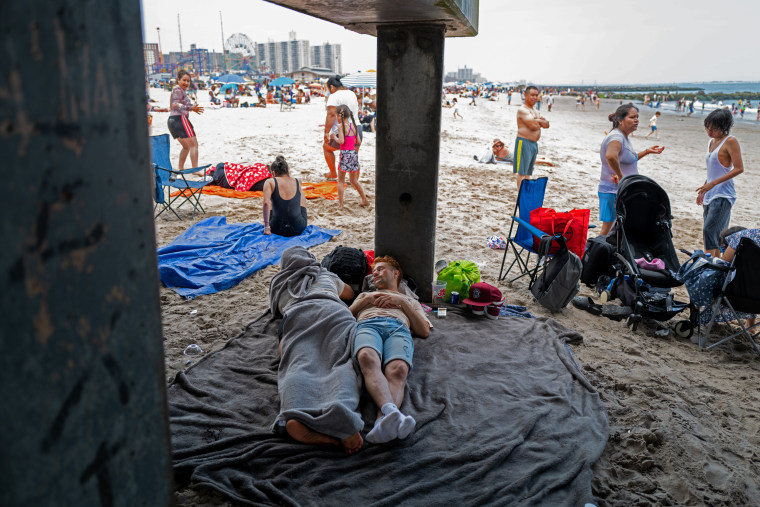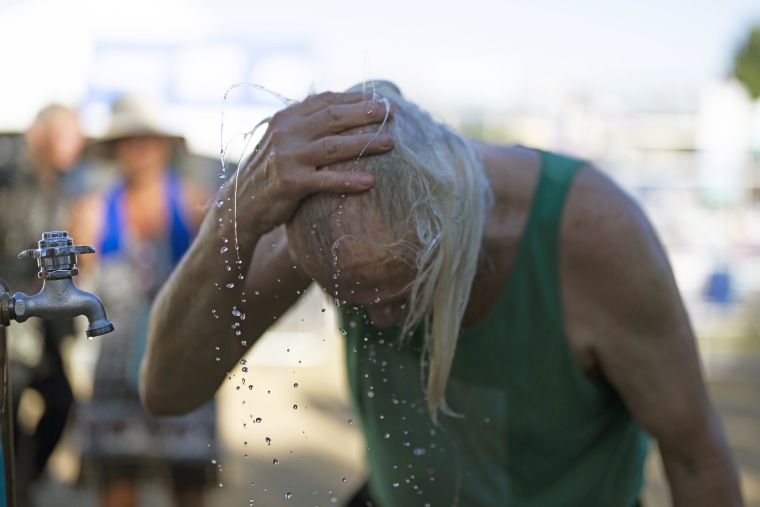A long-running heat wave that has already shattered previous records across the U.S. will persist, baking parts of the West with dangerous temperatures that will soar into the 100s and holding the East in its hot and humid grip throughout the week, forecasters said Sunday.
An excessive heat warning — the National Weather Service’s highest alert — was in effect for about 36 million people, or about 10% of the population, with temperatures in Oregon expected to exceed 100 degrees Fahrenheit (37.7 degrees Celsius) and as high as 115 degrees (46.1 C) in some parts of California on Sunday, said NWS meteorologist Bryan Jackson.
“We’re expecting a few dozen of them, on the order of 30, to tie or break their daily high temperature record” in the West and Pacific Northwest, Jackson said.

Scorching temperatures broke numerous records on Saturday: Reading, California, had a record high of 119 degrees Fahrenheit (48.3 degrees Celsius), breaking its all-time record high of 118; Ukiah, north of San Francisco, hit 117 degrees Fahrenheit (47 degrees Celsius), breaking the city’s record for the date and tying its all-time high; and Livermore, east of San Francisco, hit 111 F (43.8 C), breaking the daily maximum temperature record of 109 F (42.7 C) set more than a century ago in 1905.
Las Vegas tied the record of 115 F (46 C), last reached in 2007, and Phoenix topped out at 114 F (45.5 C), just shy of the record of 116 F (46.7 C) dating to 1942.
Marko Boscovich said the best way to beat the heat in Las Vegas is in a seat at a slot machine with a cold beer inside an air-conditioned casino.
“But you know, after it hits triple digits it’s about all the same to me,” said Boscovich, who was visiting from Sparks, Nevada, to see a Dead & Company concert Saturday night at the Sphere. “Maybe they’ll play one of my favorites — ‘Cold Rain and Snow.’”
On the more-humid East Coast, temperatures above 100 degrees were expected, though no excessive heat advisories were in effect for the region on Sunday, Jackson said. On Saturday, Raleigh, North Carolina, reached an all-time record high of 106 degrees F (41.1 C), with a maximum heat index of 118 F (47.7 C), he said.

“Drink plenty of fluids, stay in an air-conditioned room, stay out of the sun, and check up on relatives and neighbors,” read a National Weather Service advisory for the Baltimore area. “Young children and pets should never be left unattended in vehicles under any circumstances.”
Heat records shattered across the Southwest
Rare heat advisories were extended even into higher elevations including around Lake Tahoe, on the border of California and Nevada, with the National Weather Service in Reno, Nevada, warning of “major heat risk impacts, even in the mountains.”
“How hot are we talking? Well, high temperatures across (western Nevada and northeastern California) won’t get below 100 degrees (37.8 C) until next weekend,” the service posted online. “And unfortunately, there won’t be much relief overnight either.”
Indeed, Reno hit a high of 104 F (40 C) on Saturday, smashing the old record of 101 F (38.3 C).
More extreme highs are in the near forecast, including 129 F (53.8 C) for Sunday at Furnace Creek, California, in Death Valley National Park, and then around 130 F (54.4 C) through Wednesday.
The hottest temperature ever officially recorded on Earth was 134 F (56.67 C) in July 1913 in Death Valley, eastern California, though some experts dispute that measurement and say the real record was 130 F (54.4 C), recorded there in July 2021.
Deaths are starting to mount
In Arizona’s Maricopa County, which encompasses Phoenix, there have been at least 13 confirmed heat-related deaths this year, along with more than 160 other deaths suspected of being related to heat that are still under investigation, according to a recent report.
That does not include the death of a 10-year-old boy last week in Phoenix who suffered a “heat-related medical event” while hiking with family at South Mountain Park and Preserve, according to police.
California wildfires fanned by low humidity, high temperatures
Firefighters dispatched aircraft and helicopters to drop water or retardant on a series of wildfires in California.
In Santa Barbara County, northwest of Los Angeles, the Lake Fire has scorched more than 19 square miles (49 square kilometers) of grass, brush and timber. Firefighters said the blaze was displaying “extreme fire behavior” and had the “potential for large growth” with high temperatures and low humidity.
Festival revelers meet the heat with cold water and shade
At the Waterfront Blues Festival in Portland, Oregon, music fans coped by drinking cold water, seeking shade or freshening up under water misters. Organizers of the weekend revelries also advertised free access to air conditioning in a nearby hotel.
Angelica Quiroz, 31, kept her scarf and hat wet and applied sunscreen.
“Definitely a difference between the shade and the sun,” Quiroz said Friday. “But when you’re in the sun, it feels like you’re cooking.”

